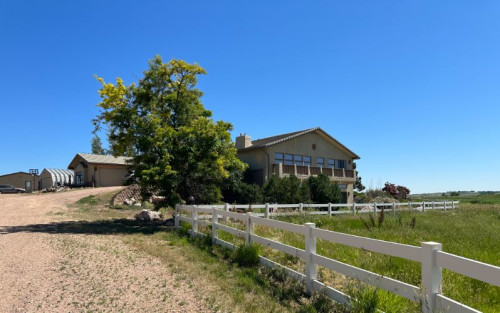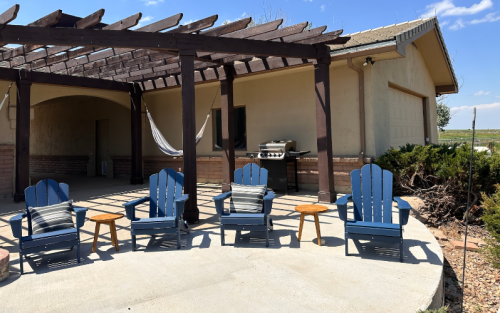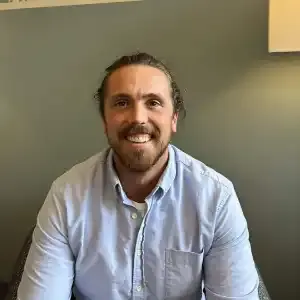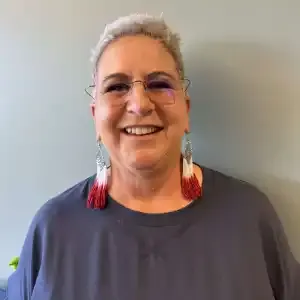








Flatirons Recovery
Verified Center
This provider's information has been quality-checked by Recovery.com's Research Team for accuracy and completeness, including center verification through appropriate third-party organizations.
Treatment Focus
This center treats substance use disorders and co-occurring mental health conditions. Your treatment plan addresses each condition at once with personalized, compassionate care for comprehensive healing.
Primary Level of Care
Outpatient treatment offers flexible therapeutic and medical care without the need to stay overnight in a hospital or inpatient facility. Some centers off intensive outpatient program (IOP), which falls between inpatient care and traditional outpatient service.
Treatment Focus
This center treats substance use disorders and co-occurring mental health conditions. Your treatment plan addresses each condition at once with personalized, compassionate care for comprehensive healing.
Primary Level of Care
Outpatient treatment offers flexible therapeutic and medical care without the need to stay overnight in a hospital or inpatient facility. Some centers off intensive outpatient program (IOP), which falls between inpatient care and traditional outpatient service.
Provider's Policy
Flatirons works with most major private insurance carriers. They do NOT accept Medicare, Medicaid, or any state funded insurances.
Flatirons Recovery
Flatirons Recovery
About Flatirons Recovery
Nestled on an 80-acre horse farm, Flatirons Recovery is a safe retreat for people on a journey to heal from substance use, mental health disorders, or dual diagnosis. Flatirons understands the challenges that come with seeking treatment while managing the demands of everyday life. That’s why they offer day treatment (partial hospitalization or PHP) and intensive outpatient programs (IOP), with a recovery residence available for clients who need it.
Discover Transformative Therapies
Flatirons Recovery’s core holistic treatments include mindfulness-based therapy to improve emotional regulation, gender-specific programs to address challenges unique to men and women, and the CRAFT program to empower families to support loved ones in recovery. Day treatment includes 6 hours per day and IOP 3 hours per day of individual therapy, group therapy, psychiatry, and more.
Develop a Strong Foundation with Mindfulness
In addition to traditional cognitive-behavioral techniques, Flatirons Recovery uses a mindfulness-based approach that emphasizes staying present and aware. Techniques include meditation, yoga, and biofeedback. These methods reduce stress, improve emotional regulation, and enhance coping mechanisms, making them essential for reducing the risk of relapse and improving overall well-being.
Take a Real-World Approach to Recovery
Flatirons’ program is structured to emulate a healthy, thriving life in long-term recovery. This means clients are out and about daily, and spend time in both of Flatirons’ locations: a healing office space for clinical and therapeutic work, and a cozy modern ranch house where clients focus on self-care, nourishment, and community-building. Beyond the time on the ranch, clients can expect a focus on sober fun, with outings such as hikes, rock climbing, paddleboarding, frisbee golf, visiting museums, bowling, sporting events, and gatherings with sober-living facilities.

Highlights from the Center
Highlights
These highlights are provided by and paid for by the center.
Nature Lovers
Therapeutic Location
Customized Treatment Plans
Holistic Approach
Center Overview
Treatment Focus
This center treats substance use disorders and co-occurring mental health conditions. Your treatment plan addresses each condition at once with personalized, compassionate care for comprehensive healing.

Flatirons Recovery
Insurance Accepted
Cash Pay Rates
Estimated Cash Pay Rate
Center pricing can vary based on program and length of stay. Contact the center for more information. Recovery.com strives for price transparency so you can make an informed decision.




Sober Living with Flatirons
Recovery.com Verified Listing
Recovery.com verified that the name, location, contact information and license to operate for this treatment provider are valid and up-to-date.

Joint Commission Accredited

Licensed
Recovery.com is an independent, third-party mental health resource. Verification does not imply endorsement and does not guarantee the quality of treatment services.
Meet Your Care Team

Mark Oberg
Co-Founder & CEO
LPC, LAC

Rachael Uris,
Co-Founder & Director of Community Outreach
MA

Anya Garvey
Clinical Supervisor
LPC

Dr. Brian K. Wise
Medical Director
MD, MPH, ABIHM, ABoIM

James Bowden
Director of Housing & Admissions Coordinator

Kate M. Ziesenheim
Psychiatric Physician Associate
PA-C

Justin Virant
Lead IOP Therapist
MA, LPCC

Felicity Olson
Clinical Program Manager
LSW

Rose Hedreen
Primary Therapist
LSW

Cam Murphy
Primary Therapist
MA, LPCC

Ryan Gibbe
Case Manager

Jaroed Sarmiento
House Manager

Brian Klink
Recovery Coach

Heather Lister
Peer Recovery Coach And CRAFT Facilitator

Nick Fruth
AcuDetox Provider And Recovery Coach

Tracy Barnes
Behavioral Health Technician

Pippa
Therapy Dog
Your Care Options
Specializations
Alcohol
Using alcohol as a coping mechanism, or drinking excessively throughout the week, signals an alcohol use disorder.
Cocaine
Cocaine is a stimulant with euphoric effects. Agitation, muscle ticks, psychosis, and heart issues are common symptoms of cocaine abuse.
Drug Addiction
Drug addiction is the excessive and repetitive use of substances, despite harmful consequences to a person's life, health, and relationships.
Heroin
Heroin is a highly addictive and illegal opioid. It can cause insomnia, collapsed veins, heart issues, and additional mental health issues.
Holistic
A non-medicinal, wellness-focused approach that aims to align the mind, body, and spirit for deep and lasting healing.
Methamphetamine
Methamphetamine, or meth, increases energy, agitation, and paranoia. Long-term use can result in severe physical and mental health issues.
Opioids
Opioids produce pain-relief and euphoria, which can lead to addiction. This class of drugs includes prescribed medication and the illegal drug heroin.
Prescription Drugs
It's possible to abuse any drug, even prescribed ones. If you crave a medication, or regularly take it more than directed, you may have an addiction.
Who We Treat
Young Adults
Emerging adults ages 18-25 receive treatment catered to the unique challenges of early adulthood, like college, risky behaviors, and vocational struggles.
LGBTQ+
Addiction and mental illnesses in the LGBTQ+ community must be treated with an affirming, safe, and relevant approach, which many centers provide.
Midlife Adults
For adults ages 40+, treatment shifts to focus on the unique challenges, blocks, and risk factors of their age group, and unites peers in a similar community.
Treatment Services
Day Treatment
In a PHP, patients live at home but follow an intensive schedule of treatment. Most programs require you to be on-site for about 40 hours per week.
Intensive Outpatient Program
In an IOP, patients live at home or a sober living, but attend treatment typically 9-15 hours a week. Most programs include talk therapy, support groups, and other methods.
Outpatient
During outpatient rehab, patients attend a structured treatment program while continuing to live at home.
Approaches
Evidence-Based
A combination of scientifically rooted therapies and treatments make up evidence-based care, defined by their measured and proven results.
Holistic
A non-medicinal, wellness-focused approach that aims to align the mind, body, and spirit for deep and lasting healing.
Personalized Treatment
The specific needs, histories, and conditions of individual patients receive personalized, highly relevant care throughout their recovery journey.
Wellness
Wellness philosophies focus on the physical, mental, and spiritual wellness of each patient, helping them restore purpose with natural remedies.
Therapies
1-on-1 Counseling
Patient and therapist meet 1-on-1 to work through difficult emotions and behavioral challenges in a personal, private setting.
Meditation & Mindfulness
A practiced state of mind that brings patients to the present. It allows them to become fully aware of themselves, their feelings, and the present moment.
Mindfulness Therapy
This ancient practice can be mental, emotional, and even spiritual. In meditation, you focus your attention on the present moment without judgement.
Adventure Therapy
This experiential approach uses the physical and emotional challenges of outdoor activities as tools for personal growth.
Art Therapy
Visual art invites patients to examine the emotions within their work, focusing on the process of creativity and its gentle therapeutic power.
Conditions We Treat
Grief and Loss
Grief is a natural reaction to loss, but severe grief can interfere with your ability to function. You can get treatment for this condition.
ADHD, ADD
ADHD is a common mental health condition caused by dopamine imbalance. Common symptoms include inattention, hyperactivitiy, and impulsivity.
Anger
Although anger itself isn't a disorder, it can get out of hand. If this feeling interferes with your relationships and daily functioning, treatment can help.
Anxiety
Anxiety is a common mental health condition that can include excessive worry, panic attacks, physical tension, and increased blood pressure.
Bipolar
This mental health condition is characterized by extreme mood swings between depression, mania, and remission.
Codependency
Codependency is a pattern of emotional dependence and controlling behavior. It's most common among people with addicted loved ones.
Depression
Symptoms of depression may include fatigue, a sense of numbness, and loss of interest in activities. This condition can range from mild to severe.
Post Traumatic Stress Disorder
PTSD is a long-term mental health issue caused by a disturbing event or events. Symptoms include anxiety, dissociation, flashbacks, and intrusive thoughts.
Stress
Stress is a natural reaction to challenges, and it can even help you adapt. However, chronic stress can cause physical and mental health issues.
Substances We Treat
Alcohol
Using alcohol as a coping mechanism, or drinking excessively throughout the week, signals an alcohol use disorder.
Benzodiazepines
Benzodiazepines are prescribed to treat anxiety and sleep issues. They are highly habit forming, and their abuse can cause mood changes and poor judgement.
Chronic Relapse
Consistent relapse occurs repeatedly, after partial recovery from addiction. This condition requires long-term treatment.
Co-Occurring Disorders
A person with multiple mental health diagnoses, such as addiction and depression, has co-occurring disorders also called dual diagnosis.
Cocaine
Cocaine is a stimulant with euphoric effects. Agitation, muscle ticks, psychosis, and heart issues are common symptoms of cocaine abuse.
Drug Addiction
Drug addiction is the excessive and repetitive use of substances, despite harmful consequences to a person's life, health, and relationships.
Heroin
Heroin is a highly addictive and illegal opioid. It can cause insomnia, collapsed veins, heart issues, and additional mental health issues.
Methamphetamine
Methamphetamine, or meth, increases energy, agitation, and paranoia. Long-term use can result in severe physical and mental health issues.
Languages
Aftercare
Care Designed for Your Needs
Personal Amenities
Amenities
Special Considerations
Activities
Yoga
Yoga is both a physical and spiritual practice. It includes a flow of movement, breathing techniques, and meditation.
Learn More About the Center
What to Expect Week to Week
Learn what treatment will be like from introduction to settling, then integrating to transitioning.
Mindfulness-Based Journal Prompts for Self-Discovery
Explore a collection of journal prompts designed to connect to inner wisdom and navigate life’s challenges.
How to Meal Plan to Boost Mental Health
Learn why and how to make meal prepping a vital part of the mental health journey.
The Importance of Community in Long-Term Recovery
Find out why a strong community can mean the difference between long-term recovery and relapse.
What people are saying
Treatment
5.0
Accommodations
5.0
Food & Nutrition
4.0
Value
4.5
LW
Treatment in 2023 • (90 days) • Reviewed 02/26/23
Former Client
•Firefighter





